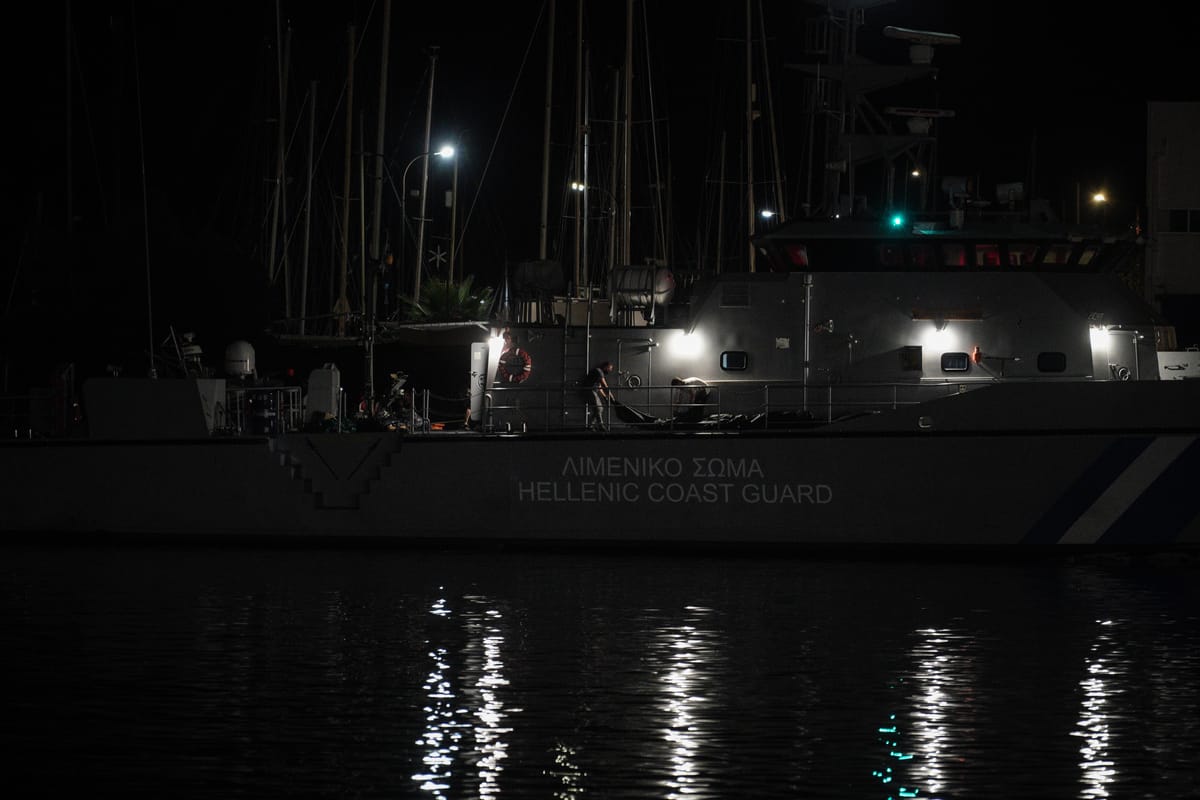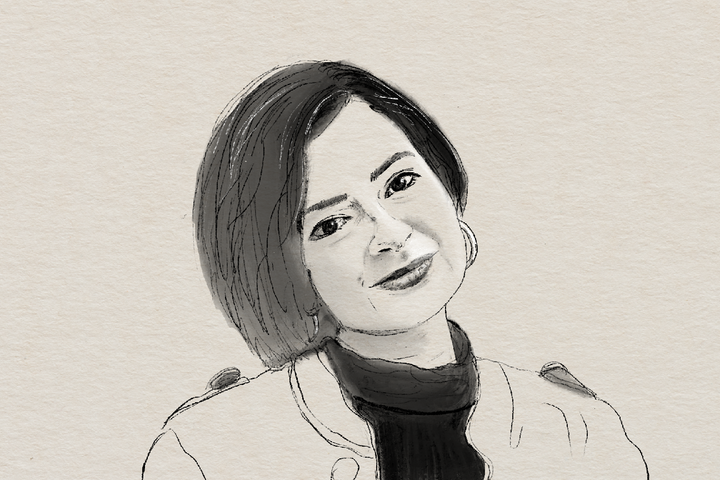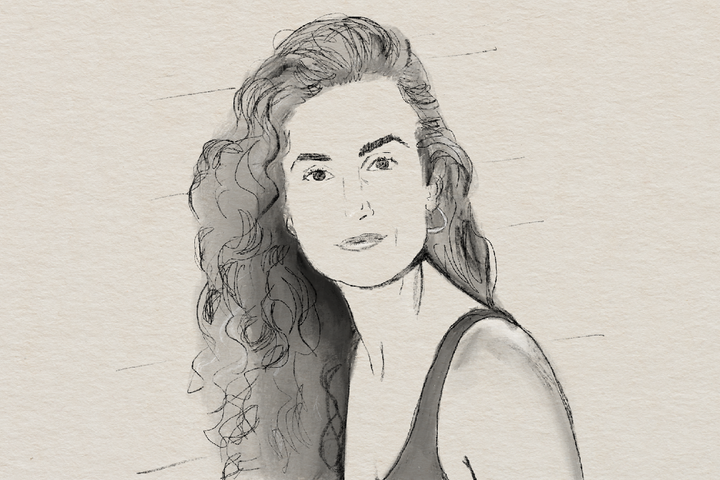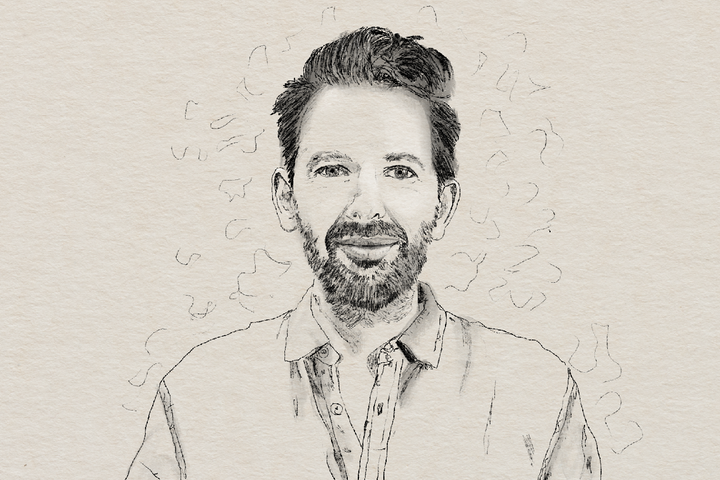In-conversation: Six Months Since the Deadly Pylos Shipwreck
More than six months after the deadly Pylos shipwreck, Human Rights Watch says that Greek authorities’ investigations into what happened “have made little meaningful progress.”

In June 2023, a fishing trawler packed with hundreds of people set off from Libya, the North African country where human rights organizations have documented refugees and migrants living in degrading conditions and, at times, being sold in what amount to slave auctions.
Aboard the Adriana were Syrians, Palestinians, Egyptians, and Pakistanis, among others. The boat was headed for Italy, but it was swept off route, toward Greece. It ended up stranded at sea. Some 47 nautical miles from Greece's Pylos, the Greek coastguard eventually approached the Adriana.
On June 14, the boat went under. Later, refugees and migrants who had been aboard the boat recounted the Greek coastguard tying a rope to the vessel and attempting to tow it, an effort that, they said, caused it to sink.
Some human rights observers and advocates worried that Greek authorities had potentially attempted to push the boat back into international waters. Those fears were supported by testimonies of those who survived the wreck.
“If they hadn’t pulled us, [the boat] wouldn’t have rocked and no one would have died,” one refugee, a Syrian teenager, told me at Greece’s Malakasa refugee camp after the wreck. “But they did die.”
Of the estimated 400 to 750 passengers, only 104 made it to dry land alive, while only eighty-two bodies were recovered. Among those who died were children, though the exact number remains unknown.
Greek officials denied claims that the coastguard tried to tow the trawler and claimed the passengers rejected help. Prime Minister Kyriakos Mitsotakis blamed smugglers “who trade in human suffering, exploit human weaknesses, and load persecuted people into rotten boats.” The European Union called for an investigation.
It wasn’t the first time that refugees and migrants died along the route to Europe. Since 2014, more than 28,000 people have died in the Mediterranean Sea, according to the Missing Migrants Project.
Nor was it the last time such tragedy struck refugees and migrants at sea. On Sunday, dozens of asylum seekers, including women and children, reportedly died when a boat carrying some 86 people sank off the Libyan coast.
More than six months after the deadly shipwreck, Human Rights Watch (HRW) says that Greek authorities’ investigations into what happened “have made little meaningful progress.”
I spoke with Bill Van Esveld, HRW’s associate director of HRW's children's rights division, about the deadly Pylos shipwreck, the six months since the tragedy, and the broader situation for children making the dangerous journey to Europe.
Patrick Strickland: A little more than six months on, do we have a clear idea of how many children were aboard the Adriana, and how many of them died when the ship went under?
Bill Van Esveld: We don’t know. This is part of the problem. There isn’t an official, public list of the people who were on board the trawler. It could be over 560 missing people in total, but only eighty-two bodies were recovered and of those, only fifty-eight have been identified. Some survivors described seeing children’s bodies in the water.
To its credit, Greece for the first time activated a “Disaster Victims Identification” protocol and is cooperating with the ICRC and some of the countries of origin, and this means that relatives can send DNA samples from abroad to Greece, they’ve collected 550 samples. Still, that only goes so far–some people will think twice before approaching a government that their relatives tried to escape, to hand in their DNA and all their details. Some people are from areas of Syria that are not under government control.
There’s something that could have been done to get more information about the dead, but it wasn’t. We interviewed twenty-one survivors and also spoke to another five relatives of people who are presumed lost. Several of them said they approached the Greek authorities, or tried to, because they wanted to share information about people they knew who were also on the boat, but the authorities weren’t interested in taking that information. They asked and they definitely weren’t allowed to see the bodies, which could have helped, and there are two dozen bodies that are still unidentified. The people suffering from this now are the families of the missing in Syria, Egypt and Pakistan. And the survivors, who keep getting phone calls from the families, asking if their loved ones have been seen alive.
PS: For those that survived, what have their situations been like in Greece and Europe since the deadly shipwreck?
BVE: It was, well, grim and interesting to see how they were treated in Greece. There were 104 survivors, and most of them—not including the nine Egyptians who are in jail and accused of smuggling—seem to have been able to get out of Greece faster than many other asylum seekers have managed.
Of course, if you arrive by boat from Turkey, you are first stuck in one of the “closed controlled access centers” on the Aegean islands. If you’re then allowed to go to the mainland, you may be placed in a camp to wait for your asylum claim to be recognized, which can take months, a year, longer.
By the way, as soon as it is recognized, you’re kicked out of the camp—but without yet having the documents that give you the right to work, the ability to rent a place to live, or to legally leave the country. By contrast, the survivors of the Adriana disaster we interviewed generally received Greek travel documents that allowed them to leave the country within a few months and left they did. Virtually none of the survivors I spoke to said they wanted to remain in Greece, and many were scared to speak about what had happened to them except anonymously, and they said this was due to fear of reprisals from Greek authorities.
I don’t know why the Greek authorities accelerated the asylum processes for the Adriana survivors, but presumably the authorities knew that many of the survivors would leave the country. One man was in touch, who’s now in a camp in the Netherlands.
PS: More broadly speaking, for children on the migration route to the European Union, what are the risks they face along the way? Are those risks getting worse?
BVE: Big picture, the E.U.’s approach to outsourcing migration control has increased the risks that kids face on the journey. The RSF in Sudan—once a migration partner for the E.U., now accused of mass killings, rape, and ethnic cleansing in Darfur, among much else. Or the militias in Libya.
We spoke to the eight children who survived the Adriana—only eight survived, from Egypt and Syria. They were all mistreated in Libya. Some survivors had been pulled back to Libya before, and described how they were forced to work, tortured, shot at. Some of the kids were actually forced onto the Adriana about five or six days before it set sail from Libya. They said they were barely given food or water during that time, and then to that, you add all the privations and horrors in the days that followed.
PS: Are individual European governments and the European Union making the situation any easier for children who are making the journey from the Middle East, Africa, and elsewhere?
BVE: There are these moments where the truth comes out. Last year a member of parliament in the U.K. asked former Home Secretary Suella Braverman how, exactly, a child refugee was supposed to get to the U.K. to apply for asylum, and the answer was essentially, there is no way to get there legally.
Obviously, these governments should end policies that force people to take deadly journeys. The United Nations refugee agency says they should open “safe and legal routes” to apply for asylum, and you can very clearly see the moves governments make to shut down those routes, which should be opened and widened. Meanwhile, the resettlement numbers are pathetic, year after year.
PS: What needs to be—or can be—done to prevent the kind of tragedies we see children enduring along the refugee route, whether it be shipwrecks like the one off the Greek coast or violence on borders?
BVE: Imagine that someone could cross a border and safely apply for asylum and be treated with dignity while their application was being considered. That’s really all it is. And there are European governments that are disrespecting this obligation under international law.
Now, it’s gotten to the point of the Adriana. So one thing is to not let this case go. If there’s no accountability for what happened here, with 600 dead, we don’t want to know what the limit is. The survivors consistently describe how the Greek coastguard ship attached a rope and tries to tow their trawler, then accelerated and turned and sank them.
Even before this, there should have been a rescue long before the sinking. There were hours and hours when the trawler was in Greek waters and had been spotted and was virtually wearing a sign that said "Distress." There were sat-phone calls for rescue, it was overcrowded, the engine was barely working. And then after the capsizing, survivors say they were in the water for a long time before being picked up. A lot of people had clambered up onto the overturned hull of the trawler, that was now out of the water, but then it sank. They say that scores more people could have been saved even at this point, but the Greek coastguard ship had moved to a distance away and then sent out a dinghy to pick people up. Another question is why the authorities tasked only this one ship, a patrol ship, all the way down in Crete, with coming to what should have been the Adriana’s rescue. Greece had closer assets. And finally, there’s a whiff of a coverup.
Somehow there were no cameras functioning on the modern coastguard ship. All the survivors’ phones were confiscated. Several survivors’ initial statements to the coastguard were apparently doctored to exclude any mention of the towing and capsizing. This case cries out, it looks atrocious, and we had better not forget about it and move on.
In 2014, there was a case of the Greek coastguard towing a migrant boat back to Turkish waters and capsizing it: eight children and three women drowned. There was no accountability. Greece had done no justice in that case—that’s what the European Court for Human Rights concluded. And now it looks like it’s happened again but on an even more awful scale.
Subscribe to Long Road Magazine to receive dispatches and our monthly newsletter in your inbox, or donate here:



